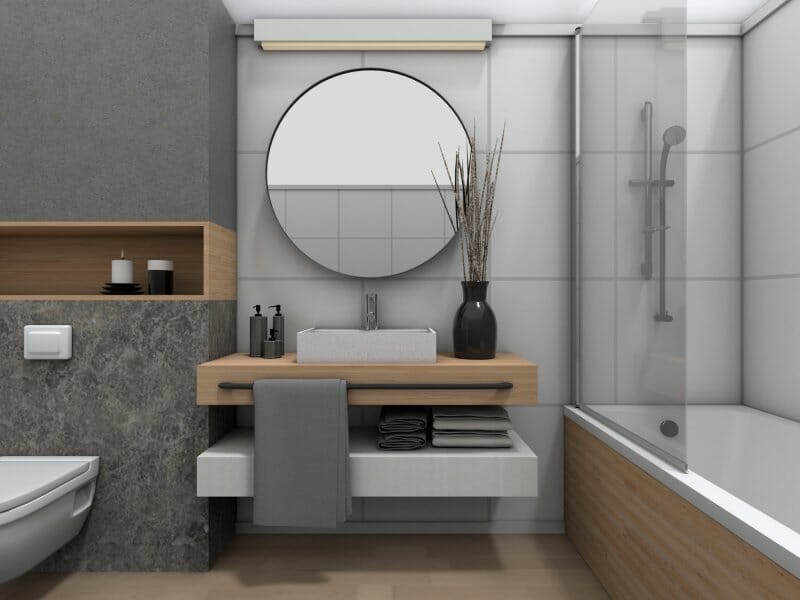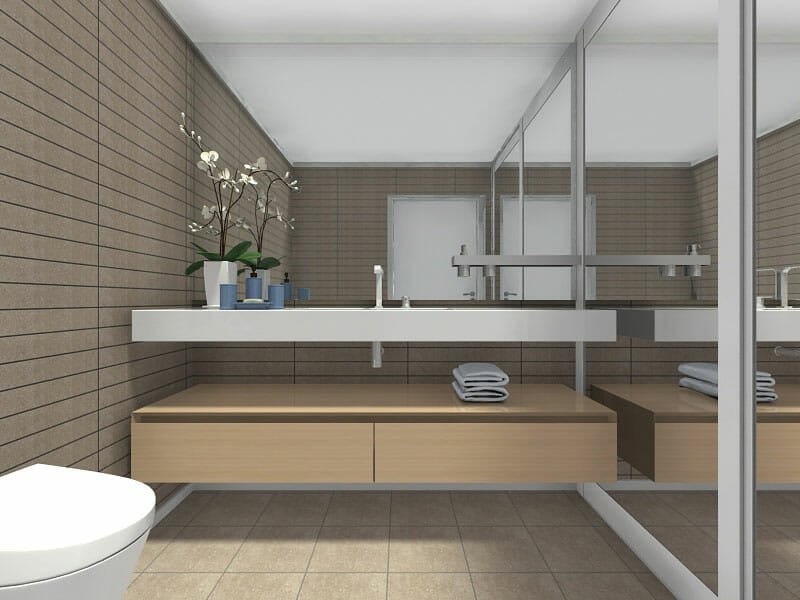Bathroom Layout 101: Design Your Dream Bathroom
A functional bathroom layout should maximize your available space and combine your bathroom fixtures with efficiency.

✍️ Article Summary:
- Start with the Essentials: Position your sink, shower, tub, and toilet first to build the foundation of your layout.
- Prioritize Space Efficiency: Choose compact or wall-mounted fixtures where needed to free up valuable floor space.
- Plan for Wet and Dry Zones: Separate showering areas from dressing zones to improve functionality and minimize water damage.
- Ensure Easy Movement and Flow: Avoid awkward door swings and obstructions—sliding or pocket doors can optimize space.
- Smart Fixture Placement: Think logically about fixtures, such as placing the mirror above the sink and towel rails near the shower.
- Optimize Storage: Use vertical space with shelves and wall-mounted storage to reduce clutter and keep the room feeling spacious.
- Design for Privacy: Use frosted glass and concealed cisterns.
- Accessibility: Install grab bars or slip-resistant flooring for safety and comfort.
- Proportional Dimensions: Use standard fixture sizes as a guideline, but always check specific product measurements for accuracy.
In this blog post, we'll show you what to consider and how to start designing your dream bathroom. Everything from what to include, sizing, and layout dimensions. We'll also give you inspiration on how to create your new bathroom.
We’ll help you position the essentials: the sink, shower, tub, and toilet. Then, we’ll cover smart storage solutions, how to separate wet and dry zones, and how to bring it together with beautiful finishes and details.
It might sound like a lot to think about, but don't worry! We'll go through step by step.

What to Consider When Designing Your Bathroom
There's plenty to think about when designing your bathroom layout. Here are some quick tips to get you started:
1. What to include:
Do you really need a bathtub? Bear in mind that a shower requires 40% less floor space. What about a single or double vanity? Or a fitted or handheld bidet? Much will depend on how much space you have available.
2. Sizing:
Consider using smaller fixtures and fittings. The standard depth of a vanity unit is typically 1 ft 8 inches (50 cm), but you could opt for a 1 ft (30 cm) unit to create extra floor space in tight rooms.
3. Zoning:
Break your room into wet and dry zones. Your wet area should have adequate waterproofing, while your dry zone should provide enough space for towel-drying and dressing.

4. Movement and flow:
You should be able to effortlessly move around your bathroom, switching from one task to another with ease. Avoid obstructions like awkward door swings. Fit an in-wall sliding door to create less of a bottleneck.
5. Positioning:
Think about where to place your bathroom fittings in relation to each other. For example, it makes sense to have a mirror above your vanity, a towel rail next to your shower, and a bidet next to your toilet.
6. Toilet design:
A wall-mounted model will make floor cleaning easier while also adding a modern touch. Use a concealed in-wall cistern to save on space.
7. Privacy:
Consider the line of sight when opening the door and be sure to use frosted glass on any windows or doors. Think about soundproofing measures like a door sweep or in-wall insulation.

8. Storage:
There are plenty of bathroom storage options available, from shelving and rails to hooks and cupboards. You can even fit a wall-mounted soap dispenser in your shower to avoid clutter.
Common Bathroom Layout Dimensions
Here are some standard dimensions to help you lay out your bathroom fittings. For more accurate measurements, remember to check your specific models before finalizing any plans.

Bathtub:
A standard tub is 2 ft 6 inches by 5 ft (76 cm by 152 cm). If you have a larger room, wider 3 ft (92 cm) models are available. You can also opt for a shorter 4 ft 6 inches (137 cm) tub to fit a smaller room.

Shower:
A shower can be as large as you want (especially in a wet room environment). But for enclosed showers, we recommend you have at least 2 ft 6 inches square (76 cm).
For a larger shower, you can increase this to 3 ft 6 inches square (106 cm). This should make washing your body more comfortable and help avoid any elbow knocks for taller people.

Toilet:
2 ft 6 inches square (76 cm) should be plenty of space to fit a standard toilet. If you have accessibility issues, the width can be increased to 3 ft (92 cm).
Opting for a concealed cistern or wall-mounted will save you about 1 ft in depth (30 cm).

Vanity:
A single vanity requires at least 2 ft of width by 1 ft 8 inches of depth (61 cm by 51 cm). But if you have the space, we recommend a larger surface or even a double vanity. This will give you plenty of room to store all those bathroom accessories.
You'll need at least 5 ft (152 cm) of width if you want to upgrade to a double vanity.

Designing for Accessibility
If you're designing a bathroom with aging in mind, you'll need to create more space. There are also additional accessories and safety features that you might want to consider.

- Shower Seat: To make showering more comfortable
- Grab Bars: For older or less able family members, install grab bars around your shower and toilet area
- Sliding Door: To make entering the room easier and avoid awkward door swings
- Elevated Toilet: A more practical design for less mobile people
- Slip-Resistant Flooring: Another safety feature to stop floors from becoming a hazard when wet
Bathroom Layout Do's and Don'ts

To summarize everything, here are do's and don'ts when designing a bathroom:
Do:
- Consider the space you have available and design your layout appropriately
- Think in terms of wet and dry zones
- Make sure to leave enough free space to move around comfortably
- Remember to position fixtures and fittings logically and include adequate storage
- Exclude fixtures or use compact alternatives if there isn't room
- Use an in-wall toilet cistern to save space
- Remember to use frosted glass on windows for privacy
Don't:
- Overcrowd a small bathroom by squeezing in too many features - it will only make the space feel cramped and uncomfortable
- Place towel rails out of reach of the shower or bath, making them inconvenient to use
- Forget to leave a generous area for drying off and getting dressed; a cramped layout can disrupt comfort and flow
- Ignore door swings - doors that block essential pathways or fixtures can create daily frustrations
- Rely on guesswork for measurements; inaccurate planning can lead to costly mistakes
- Choose mismatched fixtures and fittings that disrupt the overall harmony of the space
- Allow clutter to take over; a chaotic layout will feel smaller and less inviting
Bathroom Frequently Asked Questions
Start by deciding on what fixtures and fittings you want to include in your design. Measure your available space and use our bathroom layout planner to find the best possible layout for your space.
We recommend that you use our bathroom layout app. It’s completely free to get started and easy to use. You can download the app on your computer or tablet. Then design from scratch or try out one of our bathroom design templates.
The best layout will depend on your individual requirements. Check out our bathroom layout floor plans for some great ideas, and an overview over the various types of bathroom layouts.
Create Your New Bathroom With RoomSketcher

If you want to make sure your bathroom design works before you commit, RoomSketcher's bathroom planner is a great place to start. You can play around with different layouts and add your own measurements to see what fits best.
It's a straightforward way to plan without any stress.
See your design in both 2D and 3D; you can even take a 360° tour of your new bathroom. It helps you picture the final result and make changes easily.
Don't forget to share this post!
Looking for Inspiration?
Recommended Reads

Revamp Your Bathroom on a Budget: 7 Amazing Remodel Ideas
The kitchen is often described as the heart of the home, but the bathroom is where 'me time' takes top priority. After all, it's the place where you begin and end each day.

99 Stunning Bathroom Remodel Ideas to Inspire Your Renovation
Are you planning a bathroom reno but not sure where to start? Our mega list of bathroom design ideas should help get those creative juices flowing.

Small Bathroom Layout: 10 Ideas That Work
Short on space? RoomSketcher shows you 10 Small Bathroom Ideas that really work and how to try them in your own Bathroom Design.


